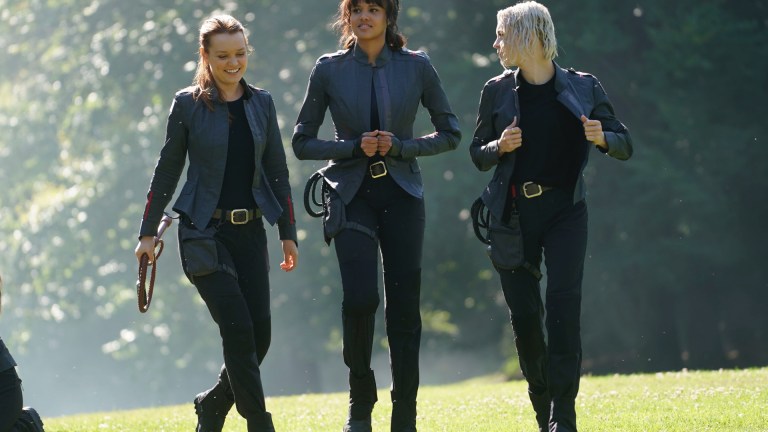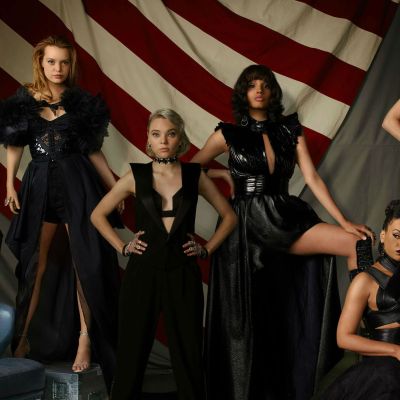Motherland: Fort Salem Creator on What’s Brewing for Season 2
Motherland: Fort Salem’s Eliot Laurence spoke with us about the events of the finale and what’s next for Freeform’s military witch drama.

The following contains spoilers for the Motherland: Fort Salem season 1 finale.
We’ve seen witches as students in the Harry Potter universe, as warriors on Buffy the Vampire Slayer, and as messy friends on Charmed. But rarely, if ever, have we seen them as government-sanctioned soldiers in the military fighting on behalf of their country and its citizens. Motherland: Fort Salem gives us a unique take on witches, war, and womanhood. Witches aren’t folk tales whispered about around campfires, they are a living, breathing people with a unique culture. And, in the world of Fort Salem, magic is not just a tool used to empower a small, hidden population of witches; it is a weapon used by militaries around the world.
We spoke with creator and showrunner Eliot Laurence (who also created Claws) about the first season, its characters, and what we can look forward to in Motherland: Fort Salem’s confirmed second season.
What to Expect in Motherland: Fort Salem Season 2
Fort Salem ends its first season with plenty of questions to explore in season 2. In the season 1 finale, Tally becomes one of Alder’s Biddies, while Raelle and Abigail mysteriously avoid certain death through some unknown force that destroys everything around them. Anacostia frees Scylla, who leads her to a Spree safehouse, which according to Laurence, will become its own storyline in season 2.
“It’s going to be so fun to see,” says Laurence of the continuing story. “It’s going to satisfy viewers in a lot of ways because people were very fascinated by the Spree, but they were like, ‘How do they work though?’”
Laurence promises we’ll “unpack” that season 1 finale bomb that Willa, Raelle’s dead mom, is not only alive but Spree in the second season, but the biggest mystery going into season 2 might just be the show’s new Big Bad: the Camarilla. How will their arrival change the dynamic between the Spree and the Army? “That soccer stadium thing … could have killed people there,” says Laurence, “but it was more important to them to release the message that our ancient enemy has returned.”
The Camarilla have made themselves known, and they are an existential threat to all witches.
“The Camarilla were behind the (Spanish) Inquisition,” adds Laurence. “They were behind the burning times in Europe. They were driving that stuff to try to identify witch bloodlines and literally wipe them out. So the Spree and the army are very mad at each other — and, p.s., we’re going to get into that. But we’re actually going to see these people saying, ‘You know what, maybe we should help each other because they’re about to take all of us out.’ It’s so juicy and personal and messy, I can’t wait.”
Where Did the Idea For Motherland: Fort Salem Begin?
Diving deeper into the world of Motherland: Fort Salem, we also talked to Laurence about the show’s conception, and some of the themes he wanted to explore.
“[The idea for the show] came from a long, long-lived obsession with anything even remotely witchy, or witch-like, or tarot card-like,” says Laurence, adding that he first started thinking aboout it as “a series like Gossip Girl, except at a witch school, and it’s in New York and it’s real exclusive and real tough, but it’s edgy and chaotic,” but eventually found the idea to be lackluster.
“It’s not interesting,” says Laurence. “So wait, what if one of the Salem witches was a witch, and cut a deal with the Massachusetts militia before we were even a country, and was like, look, ‘I will win your wars, but make a place for my people’? And that was the first big ‘What if,’ and I was so shook by it I had to sit down.” The idea evolved organically and enthusiastically from there.
Abigail Bellweather
One of Laurence’s (and our) favorite elements of the show is the character Abigail Bellweather, the latest in a long line of witches from a prominent military family. She is a Black girl who is also the privileged elite, and her family holds a position of power and influence rarely seen by women of color, Black women especially, on TV.
Television has seen its fair share of witches on-screen, from Charmed (the OG) to Charmed (the reboot), to The Vampire Diaries and its spinoffs. Witches, vampires, and werewolves are pop culture mainstays, but the depictions of these magical folks, especially when they’re portrayed by people of color, is, well, usually bad.
“It comes from just a place of imagining those early days of Alder, right?” says Laurence of the Bellweather’s elite lineage. “Like, after she proved that she could do what she said she could do, after she ended the Revolutionary War in an afternoon with her weather magic, the operation for them was to find other witches. And she found so many witches among the population of enslaved African-Americans that those people became her early officers. They became her early generals. And they became entrenched elite of the army in such a way that they were the ones with the great appointments and the mansions on the Potomac. And all of the power and entrenched supremacy. I mean, it is a flip on white supremacy.”
It’s important that these choices were made consciously and that care had been taken in crafting Abigail’s and the Bellweather’s history. It seems Laurence did the work here.
Magic As Religion
Another thing Laurence worked at was incorporating real-world religion and culture into the show. Raelle is a healer who uses Bible passages to perform her Work (“Work” being the term for magic on the show), which comes from the real-world Christo-Pagan belief that the Bible is a spellbook, a choice Laurence said was” provocative in itself.” In-universe, Raelle’s Work is treated as a lesser form. “They also feel like the way that it works is not right either because Raelle actually takes the illness into herself for a short period of time,” says Laurence. How Raelle works has a substantial effect on how she moves about the world, and how she is treated, which expands the character and makes her feel more real.
What About the Outside World?
The first season of Fort Salem introduces a rich and detailed world, but one that is sometimes insular, leaving us with gaps in knowledge of how witch culture bleeds into society at large. How much further is Laurence willing to expand our scope in season 2? I asked whether President Wade —played flawlessly by Sheryl Lee Ralph, a Black woman— would be an outlier in the world of Fort Salem, like she would be in ours.
“If we have those women in power, who were the heroes, who were the ones who represented duty, who even represented patriotism and were female, I believe that would have a trickle-down, and I think that’s what helps Wade get into office because I think those images are very potent,” Laurence says. In Motherland: Fort Salem, some of the images we’d see of heroes in textbooks, or on monuments, would be of women, including Black women.
“Emancipation happened on this timeline about 21 years earlier than it did in our timeline,” explains Laurence. “Part of the reason that that happened is that there were Black female war heroes.” Fort Salem has an apparent rich alternate history, which we hope to learn more about in the coming season.
Creating Consciously
It’s clear that Laurence is aware of how things work within the world he’s created, and how it’s presented to the audience. There are a lot of things we don’t see in the show, like how civilians interact with witches who aren’t military, or how witches integrate into society at large, but I get the feeling, everything has an in-universe logic, that he and other writers adhere to.
Importantly, there seems to be a conscious effort to do things right, and to be respectful, which is a very low bar that so many creators fail to reach. Taking care with how characters of different genders or ethnicities are portrayed, seeing them as whole people, and understanding intersectionality and how it affects them, goes a long way to making the story feel grounded and fully realized.
For now, Laurence expresses gratitude for all of the love the show has gotten on social media, “Whether it’s the fan art, or the term papers or the fan fiction, or the charts on matrilineality, the love is so inspiring,” says Laurnce And ultimately, his message to fans is a simple one, “Thank you, witches! We got a season two. I’m so happy.”
Motherland: Fort Salem season 1 is now available to watch in its entirety on Hulu.

